|
Why is the UK still not in the top ten countries for infant mortality and for maternal deaths? Why? We are a rich country. We have an established high-quality health service. Healthcare is supposed to be accessible to all. How come babies and mothers die or are badly hurt at birth? How come Black and Ethnic minority babies suffer most? Why do poor areas have worse outcomes than wealthy areas? Why is infant mortality rising? (The infant mortality rate is the number of children that die under one year of age in a given year, per 1,000 live births. The neonatal mortality rate is the number of children that die under 28 days of age in a given year, per 1,000 live births. These are both common measures of health care quality, but they are also influenced by social, economic and environmental factors). Are there fundamental problems with core policy documents like the maternity review “Better births”? These are painful questions.
Our campaign wants real improvements for mothers and babies. This posting is not intended as a clinical paper, it is a discussion amongst activists and concerned citizens about where the problems lie. A key set of participants in this discussion are mothers who have given birth, including those who have lost babies, grandmothers and other birth partners, and women who could not conceive.
Our campaign published our Maternity Manifesto during the election but though well shared on Facebook, it did not get into any parties’ manifesto.
We also called a national meeting on issues in maternity care.
What then are the factors that result in UK outcomes at birth worse than other advanced countries?
The answers include shortage of NHS funding, staffing shortages, poor management in some hospitals, staff in fear of speaking out, some policies and procedures, disrespect towards the women carrying the baby, and, as cited in the East Kent enquiry, a lack of practical understanding by staff and by mums of the need to “count the kicks” in the latter part of pregnancy. The introduction of charges for migrant women has also caused deaths. NHS material seems to centre the cause on mothers who smoke, or who are overweight. (Now smoking in pregnancy is plain stupid, it really is, and most mums would not do so if they were not addicted. Don’t do it!). However, other countries, Greece for example, who smoke more, have better outcomes in pregnancy than does the UK. Wider problems like obesity and diabetes, and even women giving birth older, are mentioned in the literature about this. Again, the age of the mother as a factor, but this is only partly true. Giving birth older is often safer than giving birth too young. Globally it is most often young girls who die in childbirth.
Answers may lie in the financially and emotionally vulnerable place that pregnant women occupy in our society, including poverty, violence and stress. Poverty and inequality are factors in infant mortality; “The sustained and unprecedented rise in infant mortality in England from 2014 to 2017 was not experienced evenly across the population. In the most deprived local authorities, the previously declining trend in infant mortality reversed and mortality rose, leading to an additional 24 infant deaths per 100 000 live births per year (95% CI 6 to 42), relative to the previous trend. There was no significant change from the pre-existing trend in the most affluent local authorities. As a result, inequalities in infant mortality increased, with the gap between the most and the least deprived local authority areas widening by 52 deaths per 100 000 births (95% CI 36 to 68). Overall from 2014 to 2017, there were a total of 572 excess infant deaths (95% CI 200 to 944) compared with what would have been expected based on historical trends. We estimated that each 1% increase in child poverty was significantly associated with an extra 5.8 infant deaths per 100 000 live births (95% CI 2.4 to 9.2). The findings suggest that about a third of the increases in infant mortality between 2014 and 2017 can be attributed to rising child poverty (172 deaths, 95% CI 74 to 266).” (Our bold for emphasis).
The UK is a rich advanced country, with a long history of universal healthcare but we have rising infant mortality. “Rising infant mortality is unusual in high-income countries, and international data show that infant mortality has continued to decline in most rich countries in recent years” and “In the most deprived local authorities, the previously declining trend in infant mortality reversed and mortality rose, leading to an additional 24 infant deaths per 100,000 live births per year, relative to the previous trend“.
Poverty is not the sole cause of high Infant Mortality though, Cuba has good outcomes equal to the UK for infant mortality. Cuba is very poor indeed and the UK is one of the wealthiest economies (sadly Cuba does less well on maternal deaths).
“Research shows out of 700,000 births a year in England and Wales, around 5,000 babies are stillborn or die before they are a month old”. 5,000 babies each year. There have been major news stories about baby deaths in many hospitals, notably in Shropshire, East Kent and Morecombe Bay.
Maternal deaths. The UK is not in the top ten countries with the lowest infant mortality rate, neither is it the safest place to give birth. In 2015-17, “209 women died during or up to six weeks after pregnancy, from causes associated with their pregnancy, among 2,280,451 women giving birth in the UK. 9.2 women per 100,000 died during pregnancy or up to six weeks after childbirth or the end of pregnancy.” In 2016 The UK ranked 24th in the world in Save the Children’s Mothers’ Index and Country Ranking Norway, Finland, Iceland, Denmark, Sweden, Netherlands, Spain, Germany, Australia, Belgium, Austria, Italy, Switzerland, Singapore, Slovenia, Portugal, New Zealand, Israel, Greece, Canada, Luxembourg, Ireland, and France, all did better than the UK. The situation in some other countries is massively worse than here but that is no excuse. But these baby and mothers’ deaths must stop. We cannot sit back and let these deaths continue.
Let’s be clear, the situation for women in pregnancy and childbirth is massively better than before the NHS, and is head and shoulders better than in the USA today. But maternal mortality is an issue here in the UK, and a huge issue in poorer countries, especially where women give birth without a trained professional being in attendance. Quite rightly professionals and campaigners in the UK participate in international endeavours to improve this situation. The NHS should be training and sending midwives to those countries, instead, it is recruiting midwives from poorer countries. In Europe we have cuts in healthcare through Austerity; in the global south, the same concept of cutting public services to the bone is called Restructuring.
Why is the UK, a rich country with (almost) universal health care not doing better by its mothers and babies? Look at just this case and see the problems in the provision of maternity care;
Archie Batten
Archie Batten died on 1 September 2019, shortly after birth.
When his mother called the hospital to say she was in labour, she was told the QEQM maternity unit was closed and she should drive herself to the trust’s other hospital, the William Harvey in Ashford, about 38 miles away.
This was not feasible and midwives were sent to her home but struggled to deliver the baby and she was transferred by ambulance to QEQM where her son died. Archie’s inquest is scheduled for March. (BBC).
We know that temporarily “closing” maternity units because they are full is a common occurrence. Women then have to go to a different hospital. Induction of labour can be halted because the unit is full. It is not a pleasant situation for mothers. Some maternity units have closed permanently, meaning mothers have to travel further for treatment, at a time when the ambulance service is under great strain (though being in labour is not considered an emergency for the ambulance service!).
Shortage of Midwives and consequent overwork for the existing staff. The UK has a shortage of three thousand five hundred midwives. The midwife workforce is skewed towards older midwives who will retire soon.
Gill Walton, general secretary and chief executive of the Royal College of Midwives said “We know trusts are facing huge pressures to save money demanded by the government, but this cannot be at the expense of safety. We remain 3,500 midwives short in England and if some maternity units regularly have to close their doors it suggests there is an underlying problem around capacity staffing levels.
Training midwives is not just about recruiting new starters to university courses. There need to be sufficient training places in the Hospitals who are already working flat out, leaving little time for mentoring of students, as well as places in the Universities. Alison Edwards, senior lecturer in midwifery at Birmingham City University, who says: ‘It isn’t as simple as recruiting thousands more students as this requires the infrastructure to support it.
‘You need more tutors, more on-site resources and, perhaps more importantly, more mentors and capacity in placement areas – which is currently under immense strain.’
One student midwife wrote about her experiences in this letter, where she described very hard work without either pay or good quality mentoring.
The government and the NHS call for Continuity Care from Midwives. This means the same midwife or small team of midwives cares for the mother through her pregnancy, birth and postnatal period. We too believe this would be wonderful if it were possible. It is however impossible with the existing ratio of midwives to mothers. Providing continuity of care to the most vulnerable mothers is a good step. NICE have reduced this to the idea of each woman having a named midwife. One to One a private midwife company claimed to provide this but was unable to continue trading, and went bust leaving the NHS to pick up the pieces.
Nationally the NHS is underfunded and looks set to continue so. Much of the problem comes from a long period of underfunding. We spend less than 9.8 per cent of GDP on health. Switzerland, Germany, France, Sweden, Japan, Canada, Denmark. Belgium Austria Norway and the Netherlands all spend more. That places the UK 13th in the list of high spenders on health care. The US spends 16.9 %. (although a lot of that money is diverted from patient care to the big corporations and insurance companies). The NHS was the most cost-efficient health care service in the world.
Underfunding causes staff shortages. Some errors at birth come from staff being overworked and making mistakes.
Some, our campaign believes, flow from fundamental flaws in government policy such as in the Maternity Review, where the pressure is on staff not to intervene in labour.
Listen to the Mother. Some of the deaths are from women not being heeded in pregnancy and childbirth. This is backed up in reports from mothers, including some quoted in the big reviews mentioned above. However, overworked and tired staff who know labour like the back of their hand can easily stop heeding an inexperienced mother.
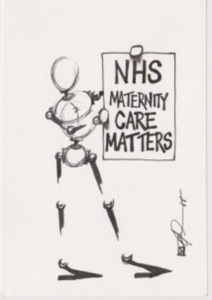
Poverty kills mothers and babies. As we said above, some deaths, poor baby health, and injuries come from growing maternal poverty and ill-health. Low-income families find it hard to afford good food. Food poverty affects a staggering number of children. The charity UNICEF estimates that “2.5m British children, or 19%, now live in food-insecure households. This means that there are times when their family doesn’t have enough money to acquire enough food, or they cannot buy the full variety of foods needed for a healthy diet. In addition, 10% of these children are also classified as living in severe food insecurity (the European average is 4%) and as a result, are set to experience adverse health.”
Studies show that;
“The Independent inquiry into inequalities in health (Acheson 1998) found that a child’s long term health was related to the nutrition and physique of his/her mother. Infants whose mothers were obese had a greater risk of subsequent coronary heart disease. Low birth weight (under 2500 g) was associated with increased risk of death in infancy and with increased risk of coronary heart disease, diabetes and hypertension in later life. Accordingly, the Inquiry recommended, ‘improving the health and nutrition of women of childbearing age and their children, with priority given to the elimination of food poverty and the reduction of obesity’. (NICE )
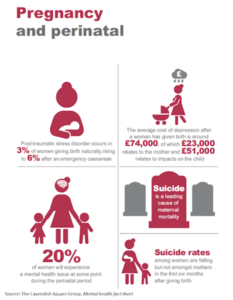
A significant number of deaths of new mothers come from mental health issues that spiral out of control. Some of these will be newly developed conditions and some existing conditions made worse by pregnancy and childbirth. Mothers family and professionals must all be on the alert and intervene early. There are good ways to treat mental health in pregnancy.
Reducing the social and economic stresses around pregnancy would also help reduce the deaths and suffering
When Birth goes wrong it can be a dreadful experience for everyone involved. In most cases, the panic button brings in a well-drilled team of experts who can solve nearly every problem and do it calmly. At other times, it is dreadful, as described in the coverage of the birth and death of baby Harry Richford. Harry Richford was born at the Queen Elizabeth the Queen Mother Hospital in Margate in 2017 but died a week later. https://www.bbc.co.uk/news/uk-england-kent-51097200
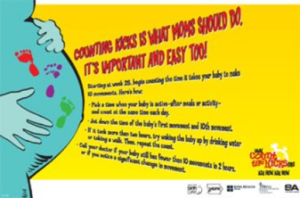
Sands, the baby death charity explains that there are many causes of babies dying before birth. Crucially important is that mothers are heeded when they are concerned and that everyone Counts the Kicks
Maternity is not the only area of the NHS that suffers. There have been serious mistakes in NHS planning including closing far too many beds. The NHS closed 17,000 beds and now is working beyond safe bed occupancy. There are 100,000 staff vacancies. Waiting times in A and E are dreadful, as are waiting times for cancer treatment. NHS managers and the Government have taken the NHS far from the Bevan model of healthcare (for history read this).
Press coverage. How does the press cover the NHS, and baby deaths? There are very real problems in the NHS and maternity care but the coverage in the press of these problems seems to switch on and off in strange ways, often to suit Conservative Party political requirements. The NHS and the Government are masters of propaganda and news manipulation. The public needs to learn to judge the news and to look both for actual problems and look out for bullshit and manipulation. Why was news of the arrest of the nurse from the Countess of Chester hospital headlines on the 70th Anniversary of the NHS? Why was the news of the understaffing there not given similar nationwide publicity? Why have we heard little or nothing since?
If the government can switch the blame to the professionals in the NHS (but not their mates the high admin of the NHS), then they seem to be happy to publicise the problems. In other cases, problems are swept under the carpet.
Professionals expect to (and do) take responsibility for their own actions. Mistakes will be made. It is impossible to go through life without some mistakes. When we are dealing with life and death mistakes can be catastrophic, even where there is no ill intent.
Malicious action is rare. There are the terrible cases of serial murderer Harold Shipman, and the convicted surgeon Ian Paterson who falsely told women, they had breast cancer and operated on them unnecessarily. The hierarchical system in the NHS and the lack of regulation in private hospital, which was described as “dysfunctional at almost every level” allowed that harm. We have not found such a case in maternity.
Unintentional bad practice, however, has also harmed babies. No one went to work intending to harm in the events publicised in the Morecombe Bay Enquiry into the deaths of 11 babies and one mother. It was said that “The prime responsibility for ensuring the safety of clinical services rests with the clinicians who provide them, and those associated with the unit failed to discharge this duty over a prolonged period. The prime responsibility for ensuring that they provide safe services and that the warning signs of departure from standards are picked up and acted upon lies with the Trust, the body statutorily responsible for those services.”
The Enquiry described what happens like this “In the maternity services at Furness General Hospital, this ‘drift’ involved a particularly dangerous combination of declining clinical skills and knowledge, a drive to achieve normal childbirth ‘whatever the cost’ and a reckless approach to detecting and managing mothers and babies at higher risk.”
The Furness General Hospital was pushing for Foundation Trust status at the time and was not exercising the necessary supervision.
“Maternity care is almost unique amongst NHS services: the majority of those using it are not ill but going through a sequence of normal physiological changes that usually culminate in two healthy individuals. In consequence, the safety of maternity care depends crucially on maintaining vigilance for early warning of any departure from normality and on taking the right, timely action when it is detected. The corollary is that, if those standards are not met, it may be some time before one or more adverse events occur; given their relative scarcity in maternity care, it is vital that every such occurrence is examined to see why it happened.“
So, many factors come into play in such incidents of harm to mother and baby. Professionals too can be emotionally wrecked by tragedy.
Huge personal and professional lessons can be learned from a detailed review of cases where mistakes are made. There is a whole literature about learning from mistakes. The worst such incidents are referred to as Never Events. This is just one article about such errors but there is a whole field of research devoted to it. Serious Mistake Reviews often happen at the end of shifts, and in the worst cases, may lead to long public enquiries.
NHS as a research organisation One of the great virtues of the NHS is the research base it offers professionals. What happens in the NHS which covers 62 million people is studied, evaluated, and researched. This is invaluable to staff and above all to patients. Sadly this research is also of interest to big business especially to those who sell health insurance and to the big corporations who have their ‘snouts’ in the NHS ‘trough’. Research for the common good is clearly different from research to make money. We see that regularly in big pharma. Cheap effective medicines do not make money for the companies. Yet the government is giving away our medical data to companies to make a profit.
There are also “errors” that happen when everyone is following accepted procedures and protocols; “untoward events, complications, and mishaps that resulted from acceptable diagnostic or therapeutic practice”. Procedures within the NHS can be robust and well researched, and problems still occur.
https://www.mamaacademy.org.uk/news/mbrrace-saving-lives-improving-mothers-care-2019/
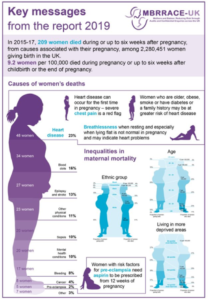
Research matters. Only by studying outcomes can these errors be revealed. A classic example is the once customary practice of episiotomy, cutting a woman to prevent tears to the perineal skin in childbirth, which is now no longer used except in an emergency. Research both formal and informal changed that practice. As another example of such research, Liverpool Women’s hospital has been involved in research about the benefits of leaving the baby attached by the cord if they are born unwell. NHS staff and other health professionals, academics and pressure groups are working hard to improve outcomes for mothers and babies. Each mothers death is reviewed in the MBRRACE-UK report
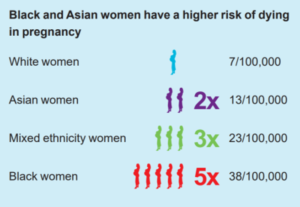
https://mamadoc.co.uk/the-maternal-mortality-report-we-should-all-learn-from/
Never again. The tragedy of the death of a mother and or baby is felt by that whole extended family. Most families want to know it will never happen again. Cover-ups and lies mean it will happen again, so brutal honesty is needed.
The aftermath of medical treatment or neglect which causes real harm is complex. Whether the outcome is death, life long impairment, or long term physical and mental health issues, these are very significant events for all concerned.

Campaigners in Liverpool campaign for SEN funding to be returned. 2019
If a baby is born with life-changing impairments, the baby is left facing catastrophic difficulties and the mother and family can face major heartbreak and hardship. The huge love we have for our kids (may it long continue), whatever their issues, does not prevent the financial, housing and employment issues families with disabled children face. Nor does it guarantee the best educational opportunities, SEN is being battered by cuts. but parents and teachers are fighting back.
The cost of financial “compensation” from an injury to a newborn is huge because it is life long. The cost of this “compensation” used to be carried by the government but the system changed to make hospitals “buy” insurance from a government body which is set up like an insurance company. The cost to the hospital is charged on the basis or earlier claims, like car insurance. Obstetrics make the highest claims of any section of the NHS.
Liverpool Women’s Hospital had a huge case (not about babies) some years ago, arising from a surgeon who left many women damaged after incontinence operations. Their total bill, over 5 years, according to the Echo, was £58.8 million. “The NHS trust has been forced to pay out £58.8m in the last five years for both recent and historic negligence cases.”
The limited work we do, as a campaign, in holding the hospital to account, leads us to believe lessons have been learned by the hospital. However, in every hospital, there are pressures which could lead to problems. These pressures include financial and organisational, problems of management ethos, and the potential for bullying, the distrust by the staff of their management, and disrespect for whistleblowers.
The NHS has gone through years of reorganisation after reorganisation. In that time the financial and government pressure has been to complete the re-organisation, or face catastrophic consequences so very many hours of admin and senior doctor time has been wasted on this process. That time could have been focussing on saving babies.
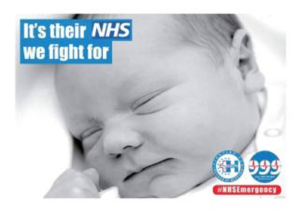
At STP and national level, there are other problems. The NHS is intensely political. There are deep structural problems. (We believe the NHS should return to the Bevan Model of health care)
The NHS is not only deprived of adequate funding, but it has also been forced to implement many market-based changes, including the internal market, outsourcing and commissions of services to for-profit companies. These market-based structures are expensive.
The NHS has also seen dire staff shortages resulting from stupid decisions like removing bursaries, not training enough doctors and the hostile environment to migrant staff.
There are moral and financial issues in all cases of such errors. The hurt to the babies is our priority.
Baby deaths and severe injury at birth have complex roots. Though what happens in the hospital is crucial, it is not just what happens in the hospitals that matter. The stress, poverty and anxiety many mothers endure during pregnancy do sometimes affect the outcomes for the child. Many women are still sacked for being pregnant but families can rarely cope with just one wage (do fight back against sacking pregnant women!). See Maternity Action for details. Both mums and midwives can call Maternity Action for advice.
Low pay or the dreaded universal credit can make food heating and rent all too expensive. This can lead to food poverty. Women do not yet have real equal pay but mothers have the worst pay of all Benefits are no longer allowed for a third child. even though most claimants are working. Whether parents are working or not, every child has a right to food and shelter, be they first or 10th child. The child gets no choice!
Not every pregnant woman is in a stable caring relationship. Housing, especially private renting, becomes more difficult when women are pregnant. Who can forget the story of the homeless woman giving birth to twins in the street? Pregnancy is often the time when domestic violence is inflicted on a woman but it is the time when women are least able to walk away. Poverty kills babies too.
Please join us in campaigning for better outcomes for all mothers and babies in the NHS and across the globe. We want this to start a discussion, so please send us your views. and information |